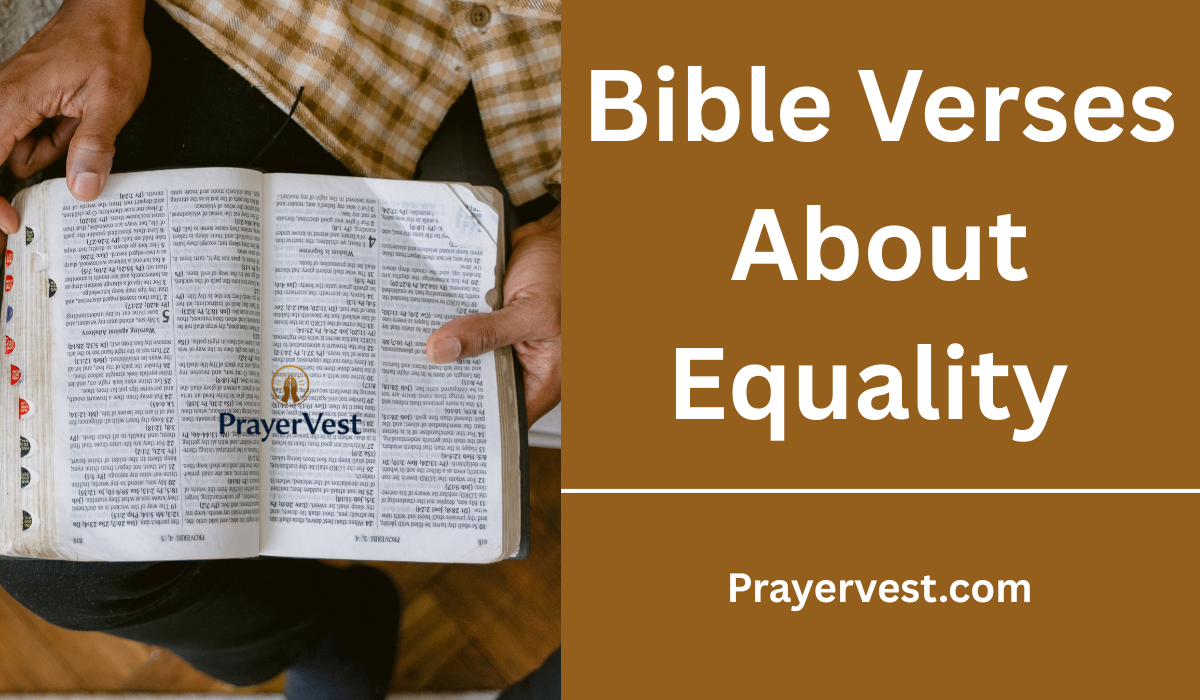The Bible affirms that all humans are made in God’s image and constantly highlights the intrinsic worth and dignity of every human being. This fundamental fact emphasizes the equality principle by reminding believers that no one is better or worse in God’s eyes because of their ethnicity, gender, social standing, or level of income.
Scripture continuously advocates for justice, fairness, and respect in interpersonal relationships and society, from the first chapters of Genesis to the teachings of Jesus and the apostles. Acknowledging our common humanity is not just morally right; it also reflects God’s nature and His desire for peace among His creatures.
Biblical teachings on equality go beyond moral principles to provide useful advice for day-to-day living. Regardless of social differences, passages on compassion, justice, and love teach believers to treat people fairly, mercifully, and with dignity.


Jesus modeled a radical commitment to equality that goes beyond conventional standards through his dealings with underprivileged groups, including women, lepers, tax collectors, and Samaritans. In a similar vein, Paul, Peter, and James’ letters stress that all believers—Jewish or Gentile, slave or free, male or female—are united and equally precious in Christ’s body.
The Bible’s message of equality remains timeless and countercultural in a society where prejudice, bigotry, and injustice are still pervasive. It pushes Christians to stand up to prejudice in society, support the underprivileged, and build communities that are a reflection of God’s compassion and justice. Studying biblical passages regarding equality not only broadens one’s spiritual perspective but also motivates one to take concrete steps to promote inclusivity and justice. Scripture serves as a reminder that equality is a divine command that directs our relationships with God, others, and ourselves rather than a human invention.
40 Inspiring Bible Verses About Equality (2026)
1. Genesis 1:27
“So God created mankind in his own image, in the image of God he created them; male and female he created them.”
This verse establishes the fundamental principle of equality at the very beginning of creation. Every human, regardless of gender, ethnicity, social status, or ability, reflects God’s image. This divine imprint gives intrinsic value to every person and forms the foundation for human dignity, respect, and fairness. Recognizing this equality challenges societal hierarchies and prejudices, calling believers to view and treat all people as sacred and worthy of honor, not based on external attributes but on their inherent identity as God’s creation.
2. Leviticus 19:15
“Do not pervert justice; do not show partiality to the poor or favoritism to the great, but judge your neighbor fairly.”
Here, God explicitly commands impartiality in all forms of judgment and human interaction. This instruction transcends legal matters to include social and personal relationships. Showing favoritism or bias undermines the very concept of equality and dishonors God’s standard of justice. By enforcing fair treatment for both the marginalized and the powerful, this verse establishes that every person deserves respect and fair consideration. It highlights that true justice is not influenced by wealth, status, or social connections, and it calls society to uphold equality as a reflection of divine order.
3. Proverbs 22:2
“Rich and poor have this in common: The Lord is the Maker of them all.”
This proverb emphasizes the shared origin of all humanity. Regardless of wealth, power, or social class, everyone has been created by God and possesses inherent value. Social distinctions are temporary and superficial, but divine equality is permanent and foundational. The verse reminds us that no amount of human status can elevate one person above another in God’s eyes. It also calls for humility, compassion, and fair treatment of others, recognizing that all individuals are equally precious and accountable to the Creator.
4. Acts 10:34-35
“Then Peter began to speak: ‘I now realize how true it is that God does not show favoritism but accepts from every nation the one who fears him and does what is right.’”
Peter’s declaration marks a turning point in the early church, emphasizing that God’s acceptance is not bound by ethnicity, culture, or social hierarchy. Spiritual equality is a core principle, and divine favor is granted to those who honor God through obedience and reverence, not through worldly status or privilege. This verse challenges believers to abandon prejudices and embrace inclusivity, recognizing that God’s vision of a community transcends human divisions. It calls Christians to live in a way that mirrors divine impartiality, ensuring that respect, opportunity, and acceptance are extended to all people equally.
5. Galatians 3:28
“There is neither Jew nor Gentile, neither slave nor free, nor is there male and female, for you are all one in Christ Jesus.”
Paul articulates the radical spiritual equality inherent in the Christian faith. In Christ, human-made divisions of ethnicity, social status, and gender are rendered irrelevant to one’s spiritual standing. Believers are united as a single community, equal in dignity, purpose, and access to God’s promises. This principle challenges systemic inequalities and encourages believers to cultivate communities rooted in fairness, inclusion, and mutual respect. It reinforces the idea that true equality is not merely social but spiritual, shaping the way we interact with one another in both faith and daily life.
6. James 2:1
“My brothers and sisters, believers in our glorious Lord Jesus Christ must not show favoritism.”
James warns against discrimination based on outward appearances, wealth, or status, emphasizing that God’s followers are called to impartiality. Showing favoritism contradicts the gospel and undermines the integrity of the Christian community. This verse underscores the moral responsibility of believers to treat all people equitably, ensuring that acts of kindness, opportunities, and judgment are fair and unbiased. By rejecting partiality, believers embody the principle of equality as an expression of faithfulness to God’s commands.
7. Deuteronomy 10:17-19
“For the Lord your God is God of gods and Lord of lords, the great God, mighty and awesome, who shows no partiality and accepts no bribes. He defends the cause of the fatherless and the widow, and loves the foreigner residing among you, giving them food and clothing.”
God’s impartiality is displayed in His care for the marginalized and vulnerable. He treats the powerless, the stranger, and the oppressed with the same concern as the powerful and influential. This command extends beyond social justice to a divine model of fairness and equity. Believers are called to emulate God’s example, ensuring that social structures, laws, and community practices protect and uplift every individual equally. True equality is not abstract—it is expressed through action, advocacy, and tangible support for those most at risk of neglect or exploitation.
8. Micah 6:8
“He has shown you, O mortal, what is good. And what does the Lord require of you? To act justly and to love mercy and to walk humbly with your God.”
This verse underscores that God’s desire for humanity is rooted in fairness, justice, and humility. Acting justly requires treating all people with impartiality, regardless of their social or economic standing. Walking humbly acknowledges that no one is inherently superior, and God alone holds ultimate authority. Loving mercy ensures compassion is extended to everyone, especially the vulnerable. Together, these principles form a blueprint for equality in daily life, reflecting God’s own character in how we relate to others.
9. Isaiah 1:17
“Learn to do right; seek justice. Defend the oppressed. Take up the cause of the fatherless; plead the case of the widow.”
Isaiah calls believers to actively uphold justice and equality in society. Protecting the oppressed and advocating for the marginalized demonstrates that true faith is inseparable from social responsibility. God’s concern is for all people, especially those disadvantaged or powerless. Equality, therefore, is not theoretical—it is enacted through advocacy, protection, and the consistent practice of fairness in both private and public spheres.
10. Psalm 82:3-4
“Defend the weak and the fatherless; uphold the cause of the poor and the oppressed. Rescue the weak and the needy; deliver them from the hand of the wicked.”
God instructs leaders and His people to champion the cause of the vulnerable, ensuring that social and economic disparities do not determine one’s rights or opportunities. This verse emphasizes that equality is intertwined with justice—standing for those who cannot defend themselves reflects divine priorities. It challenges believers to recognize systemic inequalities and work actively to protect those most at risk.
11. Romans 2:11
“For God does not show favoritism.”
This simple yet profound statement highlights God’s impartiality in judgment and grace. Human prejudices—whether based on ethnicity, wealth, or social status—cannot align with divine standards. All people are equally accountable to God and equally eligible for His mercy. Recognizing God’s impartiality calls believers to mirror this principle in their own interactions, promoting fairness, inclusivity, and equitable treatment in all areas of life.
12. Colossians 3:11
“Here there is no Gentile or Jew, circumcised or uncircumcised, barbarian, Scythian, slave or free, but Christ is all, and is in all.”
Paul emphasizes the unity and equality of all believers in Christ. Cultural, ethnic, and social distinctions are secondary to the shared identity found in faith. This verse challenges divisions that humans create, reminding believers that spiritual equality transcends worldly labels. It encourages communities to reflect this inclusivity, ensuring that no one is marginalized due to background or status.
13. 1 Samuel 16:7
“But the Lord said to Samuel, ‘Do not consider his appearance or his height, for I have rejected him. The Lord does not look at the things people look at. People look at the outward appearance, but the Lord looks at the heart.’”
God’s evaluation is based on the heart rather than superficial attributes, affirming that inner qualities are what truly matter. Human tendencies to judge based on appearance, wealth, or status are contrasted with divine standards. This principle forms a spiritual basis for equality, reminding believers that everyone possesses inherent worth that is not contingent on external factors.
14. Matthew 22:39
“Love your neighbor as yourself.”
Jesus’ command calls for equal love and respect toward all individuals. True equality is expressed through actions of care, empathy, and fairness, treating others with the same dignity we seek for ourselves. This instruction breaks down social, ethnic, and economic barriers, emphasizing that love must be impartial, inclusive, and universal.
15. Luke 6:31
“Do to others as you would have them do to you.”
The Golden Rule emphasizes reciprocal fairness and ethical treatment, forming a practical foundation for equality. It compels individuals to consider the rights and feelings of others, ensuring that no one is treated unjustly or as inferior. This principle encourages equitable behavior in all human relationships, fostering a society that mirrors God’s impartiality.
16. James 2:8-9
“If you really keep the royal law found in Scripture, ‘Love your neighbor as yourself,’ you are doing right. But if you show favoritism, you sin and are convicted by the law as lawbreakers.”
James reinforces the importance of rejecting favoritism, connecting equality with moral obedience. Showing partiality violates God’s law and corrupts the ethical fabric of community life. Believers are called to uphold fairness, ensuring that all people receive equal respect, opportunities, and consideration, regardless of wealth, status, or background.
17. 1 Peter 2:17
“Show proper respect to everyone, love the family of believers, fear God, honor the emperor.”
Peter commands respect for all individuals, not just those in positions of power or authority. This instruction reflects a broader biblical ethic of equality, where each person is valued and dignified. By promoting respect, believers model God’s impartiality and contribute to a society where fairness and honor are extended to everyone.
18. Proverbs 14:31
“Whoever oppresses the poor shows contempt for their Maker, but whoever is kind to the needy honors God.”
Oppressing or neglecting vulnerable individuals is portrayed as an offense against God, highlighting the sacred nature of equality. True honor and reverence for God are reflected in how we treat the marginalized. This verse links social justice and equality with spiritual obedience, emphasizing that divine priorities are fulfilled when all people are treated with fairness and compassion.
19. Matthew 25:40
“The King will reply, ‘Truly I tell you, whatever you did for one of the least of these brothers and sisters of mine, you did for me.’”
Jesus teaches that caring for the disadvantaged is equivalent to serving Him directly. Equality is not only ethical but spiritual, requiring believers to extend love, support, and justice to those often ignored or mistreated. This verse connects human treatment of others with divine evaluation, underscoring the inseparable link between faith and equality.
20. Romans 12:10
“Be devoted to one another in love. Honor one another above yourselves.”
Paul encourages believers to value others, demonstrating equality through humility, love, and respect. Placing others on equal footing—or even prioritizing their needs—reflects a countercultural ethic that challenges self-interest, status, and hierarchy. Equality is expressed not merely in legal terms but in daily interactions, attitudes, and relationships, fostering communities grounded in mutual respect and divine principles.
21. Colossians 3:25
“Anyone who does wrong will be repaid for their wrongs, and there is no favoritism.”
This verse emphasizes that God’s judgment is impartial and fair. Human distinctions such as wealth, status, or influence do not grant immunity or special favor. True equality is reflected in accountability: all people are equally responsible for their actions and equally under God’s justice. Believers are called to model this fairness in their interactions, ensuring that moral and ethical standards are applied without bias.
22. Matthew 5:45
“He causes his sun to rise on the evil and the good, and sends rain on the righteous and the unrighteous.”
Jesus highlights God’s impartial provision, showing that His blessings and care are not restricted by merit or social distinction. This natural equality reflects divine fairness and calls believers to emulate this impartiality. Recognizing that God values all people equally challenges favoritism and inspires acts of justice, generosity, and kindness toward everyone, regardless of their status or character.
23. Acts 17:26
“From one man he made all the nations, that they should inhabit the whole earth; and he marked out their appointed times in history and the boundaries of their lands.”
Paul underscores the common origin of humanity, emphasizing that all nations and peoples share the same Creator. No race, ethnicity, or nationality is superior; equality is inherent in creation. This foundational truth dismantles prejudice and provides a theological basis for unity, fairness, and the equal treatment of all people in society and within the faith community.
24. Galatians 5:14
“For the entire law is fulfilled in keeping this one command: ‘Love your neighbor as yourself.’”
Paul reinforces that love is the central principle of the law and the standard for equality. Treating others with the same care and concern as we have for ourselves eliminates bias, prejudice, and discrimination. Equality is not only about rights but also about demonstrating genuine concern for others’ welfare, regardless of their social position or background.
25. 1 Corinthians 12:13
“For we were all baptized by one Spirit so as to form one body—whether Jews or Gentiles, slave or free—and we were all given the one Spirit to drink.”
Paul teaches that the Spirit unites all believers equally, transcending ethnic, social, and cultural divisions. Spiritual equality fosters unity within the church and demands that every member is valued and included. Differences in status or background cannot justify exclusion or discrimination; the community is one body, and each member is essential.
26. James 3:9
“With the tongue we praise our Lord and Father, and with it we curse human beings, who have been made in God’s likeness.”
James reminds believers that all humans reflect God’s image, making any act of verbal harm or disrespect a violation of divine equality. Words have power to affirm or diminish, and acknowledging God’s imprint on every person ensures that speech promotes dignity, respect, and fairness toward all, regardless of their social position or identity.
27. Romans 10:12
“For there is no difference between Jew and Gentile—the same Lord is Lord of all and richly blesses all who call on him.”
Paul emphasizes that God’s grace, salvation, and blessings are accessible to all people equally. Spiritual equality transcends cultural and ethnic barriers, reinforcing that no one is inherently excluded from God’s love. Believers are encouraged to treat all people without discrimination, reflecting divine impartiality in their relationships and communities.
28. Exodus 23:3
“Do not show favoritism to a poor man in a lawsuit.”
God commands fairness and impartiality in judgment. Treating someone favorably because of their economic status violates divine justice and undermines equality. This instruction emphasizes the importance of objective fairness in legal, social, and personal decisions, ensuring that all people are treated equitably, without bias toward wealth or position.
29. Proverbs 31:8-9
“Speak up for those who cannot speak for themselves, for the rights of all who are destitute. Speak up and judge fairly; defend the rights of the poor and needy.”
This passage reinforces the responsibility of leaders and individuals to champion equality for the vulnerable. Speaking up for those without voice ensures that social disparities do not dictate who receives justice or protection. Equality is demonstrated through advocacy, fairness, and the defense of rights, reflecting God’s concern for all people.
30. Deuteronomy 16:19
“Do not pervert justice or show partiality. Do not accept a bribe, for a bribe blinds the eyes of the wise and twists the words of the innocent.”
Justice must remain impartial, free from influence, corruption, or favoritism. This verse highlights the danger of allowing external factors to distort fairness. Equality before the law is a divine mandate, and believers are called to uphold this standard by ensuring that decisions, actions, and judgments respect every person’s inherent dignity.
31. Hebrews 13:2
“Do not forget to show hospitality to strangers, for by so doing some people have shown hospitality to angels without knowing it.”
This verse emphasizes that equality extends beyond familiar communities to include strangers and outsiders. God’s love and blessings transcend boundaries, and believers are called to act with impartial hospitality, demonstrating respect, care, and inclusion toward all people, regardless of their background or status.
32. Matthew 7:12
“So in everything, do to others what you would have them do to you, for this sums up the Law and the Prophets.”
The Golden Rule reinforces equality as a principle of everyday action. Treating others with the same respect, kindness, and fairness that we desire ensures that no person is marginalized or treated unfairly. Equality becomes practical, guiding behavior in relationships, workplaces, and communities.
33. 1 Timothy 5:21
“I charge you, in the sight of God and Christ Jesus and the elect angels, to keep these instructions without partiality, and to do nothing out of favoritism.”
Paul instructs Timothy to maintain impartiality in leadership and ministry. Favoritism undermines trust, justice, and equality. Leaders must apply principles of fairness consistently, ensuring that every individual is respected and valued, and that positions of influence are exercised responsibly.
34. Luke 14:12-14
“When you give a luncheon or dinner, do not invite your friends, your brothers or sisters, your relatives, or your rich neighbors; if you do, they may invite you back and so you will be repaid. But when you give a banquet, invite the poor, the crippled, the lame, the blind, and you will be blessed. Although they cannot repay you, you will be repaid at the resurrection of the righteous.”
Jesus emphasizes inclusivity and equal treatment in social gatherings. Favoring the powerful or wealthy reinforces inequality, while including marginalized individuals demonstrates fairness, compassion, and a recognition of inherent value. True equality prioritizes those often overlooked by society.
35. Isaiah 58:6-7
“Is not this the kind of fasting I have chosen: to loose the chains of injustice and untie the cords of the yoke, to set the oppressed free and break every yoke? Is it not to share your food with the hungry and to provide the poor wanderer with shelter—when you see the naked, to clothe them, and not to turn away from your own flesh and blood?”
God calls His people to actively dismantle injustice and inequality. Faith is expressed through actions that protect, provide for, and uplift those who are oppressed or marginalized. Equality is not passive; it is demonstrated through justice, generosity, and care for all, reflecting God’s heart for fairness and compassion.
36. Proverbs 28:21
“To show partiality is not good—yet a person will do wrong for a piece of bread.”
Partiality is condemned as morally and socially harmful. Human susceptibility to favoritism can undermine justice, relationships, and community cohesion. True equality requires conscious effort to treat all people fairly, resisting selfish motives or external pressures that compromise impartiality.
37. 1 Corinthians 11:11-12
“Nevertheless, in the Lord woman is not independent of man, nor is man independent of woman. For as woman came from man, so also man is born of woman. But everything comes from God.”
Paul emphasizes interdependence and equality between genders in God’s design. Spiritual, social, and relational equality is rooted in mutual respect and recognition that all life originates from God. Hierarchies based on gender are contrary to divine intention and the holistic unity of humanity.
38. Revelation 7:9
“After this I looked, and there before me was a great multitude that no one could count, from every nation, tribe, people and language, standing before the throne and before the Lamb.”
Heavenly vision depicts equality across ethnicity, culture, and language. All people are included in God’s kingdom, regardless of earthly divisions. This vision calls believers to embrace inclusivity and fairness, reflecting the universal equality that God values.
39. Job 34:19
“Who shows no partiality to princes and does not favor the rich over the poor, for they are all the work of his hands.”
God’s impartiality contrasts with human tendencies to favor the powerful or wealthy. Equality is inherent in creation, and recognizing everyone as God’s handiwork ensures fair treatment, respect, and justice, reflecting divine priorities in daily life.
40. 1 John 4:20-21
“Whoever claims to love God yet hates a brother or sister is a liar. For whoever does not love their brother and sister, whom they have seen, cannot love God, whom they have not seen. And he has given us this command: Anyone who loves God must also love their brother and sister.”
True love for God is inseparable from love for others. This verse underscores the ethical foundation of equality: if all humans are to be loved and respected equally, partiality, hatred, and discrimination are incompatible with divine command. Equality is both spiritual and relational, expressed through sincere care, respect, and fairness toward every person.
Conclusion
The Bible’s message on equality is unambiguous: God values and loves every individual, and no human distinction—be it racial, gender, socioeconomic class, or background—diminishes that worth. Scripture emphasizes fairness, respect, and inclusivity in all facets of life and urges believers to mirror God’s justice and compassion in their treatment of others. Studying these passages serves as a reminder that equality is a timeless biblical principle based on the nature of God Himself rather than a contemporary ideal.
It takes deliberate action to live out this idea, such as accepting diversity, confronting injustice, and creating communities where each person is respected. By putting these Bible verses’ lessons about equality into practice, we demonstrate God’s love and contribute to the creation of a world that embodies the principles of His kingdom. By living lives characterized by justice, harmony, and mercy, believers not only improve relationships and society but also exalt God.






